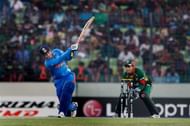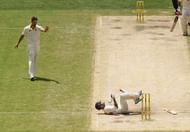
Sport is all about emotion. There is nothing like the common love for a player or team to bring the unlikeliest of people together, just as it can tear them apart. Alright, perhaps ‘tear’ is too dramatic, but I have always been a proponent of the importance of having a creative license. After all, writing is all about invoking emotion.
Reporting may be about stating the facts in an unbiased manner, but bias is inherent in writing. It is a key plank in eliciting an emotional response. Reporting elicits a response because of the facts, cold, hard, often boring facts. Writing does because of how the facts are presented. Sport brings people together and drives them apart; at least within the confines of a meta sporting reality, that exists in of itself.
But what of the emotions that drive sport? Or, for the purposes of this argument, cricket? And how closely linked are emotional responses to a player’s personality?
Emotion drives any cricketing contest. At its very heart, cricket is a game of yearning, of wanting. The bowler wants to dismiss the batsman. Failing that, he wants to bowl a dot ball. A boundary brings with it distress, a play and a miss annoyance, and a wicket joy. The batsman wants to score.
Actually, that is too simplistic. The batsman’s response depends upon his perception of the situation, his perception of the bowler, and his personality. Batting is an inherently individual activity in an ostensible team game, a sort of sporting oxymoron, only because of the uniqueness of individual action, for an individual score, depending upon the response to a wholly individual situation, has such an impact on the fortunes of the team.
However, an individual activity it is, at least in execution. How else can so many different responses to the same delivery be explained? To understand batting, one must understand Weber’s ‘Verstehen’ and put one’s self in the shoes of the batsman.
What is his temperament like? What sort of mood is he in? (Looking at you, BC Lara). What is his skill level? Only then can one understand how one batsman may leave a half volley, another may cover drive it, and a third may attempt to whip it through midwicket. Batting is more about intent, and less about execution.
Certainly, execution is important, but it is intent that determines the success or failure of the execution. What shot you choose to play, how you choose to react to a situation, determines how successful you will be. It is a player’s personality that determines how they will respond to a particular situation.
So while a Rahul Dravid would more than likely block the last over before lunch, a Virender Sehwag would probably attempt to hit the last ball of that over for a six if it was in his slot. For the purposes of this argument, Rahul Dravid is a microcosm for the prudent, methodical, analytical batsman who exercises restraint and adapts to the situation.
Virender Sehwag is that wild stallion of batsmanship that cannot be tamed, consequences be damned, whilst damning the bowlers to a sort of purgatory for the duration of his stay at the crease. Certainly, there is something to be said about the simplicity of Sehwag’s approach that is the result of an unfettered mind, and the propensity to call a spade a spade.
Consequences be damned, this is the same man who called the Bangladesh team “ordinary” before a 2011 World Cup clash in their country, and then proceeded to prove his point 175 times. For Sehwag, there are no shades of grey, just black and white. However, to merely classify Sehwag as a straight shooter is to do him a disservice. There is something almost banal about that term when applied to somebody as idiosyncratic as Sehwag seems to be.
Anybody who follows his Twitter can attest as to his ready wit and cheekiness. Cheeky is not the first word you would think of whilst describing his batting. You can think of plenty of other words. Awe-inspiring. Destructive. Brutal. Uncomplicated, but even that word seems to strip away from his batting that sense of danger, of unpredictability.
A friend once confessed to me that his favourite Sehwag innings were those where he threw it all away after a quick 20 or 30. He believed that that was the essence of Sehwag, if you will. He could exercise restraint if he wanted to - his 151 at Adelaide springs to mind as an innings so memorable only because it contained no memorable moments.
However, Sehwag always seemed to treat Cricket as a game, as it was meant to be played. See ball, hit ball. That was reflected in how he played. Other batsmen may have been content with two boundaries in an over, but if Sehwag thought he could hit another, you could be damned sure he would. Uncharitable people may have termed it brainless, but it was also inherently, wonderfully Sehwag.
Anyway, cheeky is the word that I keep coming back to. There is something cheeky about hitting the next ball exactly through the region wherein the opposing captain has just removed a fielder. He approached batting with the same wit and sense of humour he seems to approach his social media posts; firing off bits of brilliance that send his followers into a tizzy, just as he once did to fielders.
The point I am getting at, the end game if you will to all this harping about tracer bullets( with due respect to Ravi Shastri) from Sehwag’s bat and phone, is that Sehwag the batsman seemed to be an extension of Sehwag the human being. His personality shone through when he batted, in fact, one could say that it drove his batting, that it was his batting.
Batting is so much more than knowing how to bat, just as writing is so much more than knowing the meanings and spellings of words. It is about creating something, about creating an experience. And watching Sehwag bat was an experience. It almost felt like theatre, you lived every moment of frailty and vulnerability with him, just as you viewed every moment of brilliance as if on some distant planet.
If batting were a simple as knowing how to block or hit a ball, Cricket would be a boring game. Some of the most exciting moments arise due to human feeling; a poor shot that did not have to be played, a moment of brilliance that transcends the situation. Batting is about infusing yourself, your feelings, and your reactions to the relatively uncomplicated act of hitting a piece of leather with a large piece of wood. I believe that it is a player’s personality that dictates how they react.
Take for instance Sachin Tendulkar. Or more specifically, latter-day Sachin Tendulkar. Tendulkar the accumulator, the grizzled elder statesman, whose innings were remarkable for many reasons, but lacked the full-blown attacking vitriol of his youth. Were they not a manifestation of the sort of calm, grounded personality that enabled him to not only survive, but thrive, as a teenage sporting prodigy? Was there not a sense of calm, of being grounded in his innings?
Just as he took on the responsibility of being the sort of role model that India needed; calm, humble, respectful, so he took on the responsibility of being the accumulator in the batting line up, the genius who sacrificed part of his genius for perfection and consistency, because that is what the team needed from him. Certainly, it takes a great degree of not only self-control, but self-belief to cut out a shot for an entire innings, as he did with cover-drive during his unbeaten 241 in Sydney.
Tendulkar the batsman was like Tendulkar the person; he shouldered the needs of his team, just as he shouldered the hopes of a nation. His innings were remarkable for his equanimity and ability to stay calm and focused on the task at hand. For Tendulkar not only had all the shots, but also had the ability to play them against any bowler, in any situation.
But not for him the sporadic savagery of a Jayasuriya, or the flashes of artistic brilliance ala Lara. Tendulkar’s batting was unselfish, simply because he batted in a gear below what he could have, because that is what the team needed. Because that is what the nation needed.
MS Dhoni is another case-in-point. His batting is like his personality, nothing fazes him. His ability to remain calm under pressure, and face every situation with equanimity is his single greatest quality. To survive, nay thrive, as Captain of a notoriously fickle nation in the age of social media and 140 character rants, for no less than 9 years is no mean feat.
Kipling was almost certainly not thinking of Dhoni when he wrote “If you can meet with Triumph and Disaster, And treat those two impostors just the same”, but the allusion is apt. Dhoni’s batting is like Dhoni the person; calm, calculating, pragmatic even, and with the ability to see the larger picture.
The similarities between bringing the game down to a one on one showdown with the bowler, and leaving one of Tendulkar, Gambhir and Sehwag out each match in order to save 20 runs in the field are not readily apparent, but both have pragmatism and the specific pinpointing of an issue at their core.
However, there is an argument to be made for the best sportspeople being able to suppress their personality for the good of the team. Take Virat Kohli for example. On the field, he seems to have more emotions than a lovesick teenager. He wears his heart on his sleeve. You can say many things about Virat Kohli, but you cannot accuse him of not being passionate.
The man imbues emotions like nobody’s business. You feel what he is feeling; his triumph, his pain, his heartache, his desire, his happiness. Perhaps that is what makes him so popular; his relatability. He may be a superstar, but he is human, just like us. If you do not know how a game is going, take a quick peek at Kohli. How then, does one explain his batting, especially whilst chasing? How does one collate it with his ability to remain calm?
Perhaps it is not as simplistic as I am making it out to be. Perhaps one should consider Kohli, the person. Perhaps it is a result of his will to win, his razor-sharp (pun intended) focus and desire. Perhaps it is entirely natural that the same man who scored a match-saving 90 the day after his father passed away would approach chases the way he does; with absolute focus and a desire to win.
I realise that I have been guilty of acting like a cricketing administrator by only talking about the batsmen. Until they replace bowlers with bowling machines and cricket mutates into this vulgar, baseball lite sort of game, cricket is a game of batsmen and bowlers. Let us talk about Mitchell Johnson.
Specifically, because I like being different, let us talk about Johnson after the tour of South Africa in early 2014. This is perhaps the least interesting phase of Johnson’s career. Everybody talks about the prodigy, the excited phone call from Dennis Lillee to Rod Marsh wherein he proclaimed “I’ve found one”.
Everybody knows about the bowls to the left, bowls to the right phase. Everybody remembers how he broke Graeme Smith’s arm. Twice. And everybody and their dog remember how he beat, bloodied, and victimised the England team in 2013-14 by ever so briefly but ever so spectacularly adopting the countenance of a fire-breathing dragon.
However, as I said, I am different. And so I will talk about the last few series of his career.
This phase of his career began after the poignant passing away of Philip Hughes. Enough has been said about that matter, and there is nothing left to say, except that death is always a waste.
For Johnson, that was the catalyst for him morphing from the Incredible Hulk back into Dr Bruce Banner. No longer could he be the enforcer he once was. It’s all fine and dandy to say consequences be damned when there are no real consequences, but seeing first-hand the damage a cricket ball could do put everything in different terms.
By his own admission, he was no longer the same bowler because he no longer wanted to channel that aggression. He could not intimidate because he could not control whether intimidation turned into full-blown assault. The same Mephistopheles-esque figure who terrorised England with very short, very fast, very scary bowling, rushed to Virat Kohli’s side after pinging him on the helmet with a bouncer.
Just as a boxer cannot pull punches in order to be effective, a fast bowler cannot worry about hurting the batsman whilst bowling short and fast.
Emotions crept into his game; very human emotions. Fear. Caring. Kindness. Emotions at odd with the hulking, angry beast he was supposed to be. It could not come to pass.
The Hulk became Banner, Jekyll conquered Hyde.
And so, it ends. Abruptly, perhaps, but invoking emotions nonetheless. A feeling of yearning. Of wanting more. Of one more run. Of one more wicket. Of anticipation. Of seeing what comes next. Awaiting it. But being forced to adapt anyway.
Like Cricket. Maybe.
Looking for fast live cricket scores? Download CricRocket and get fast score updates, top-notch commentary in-depth match stats & much more! 🚀☄️



